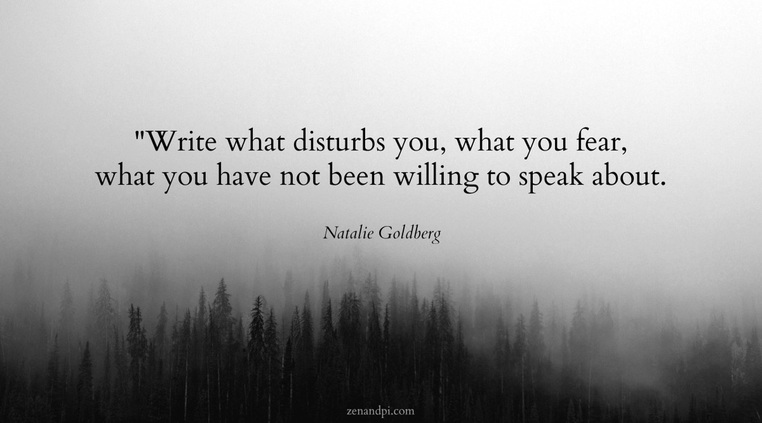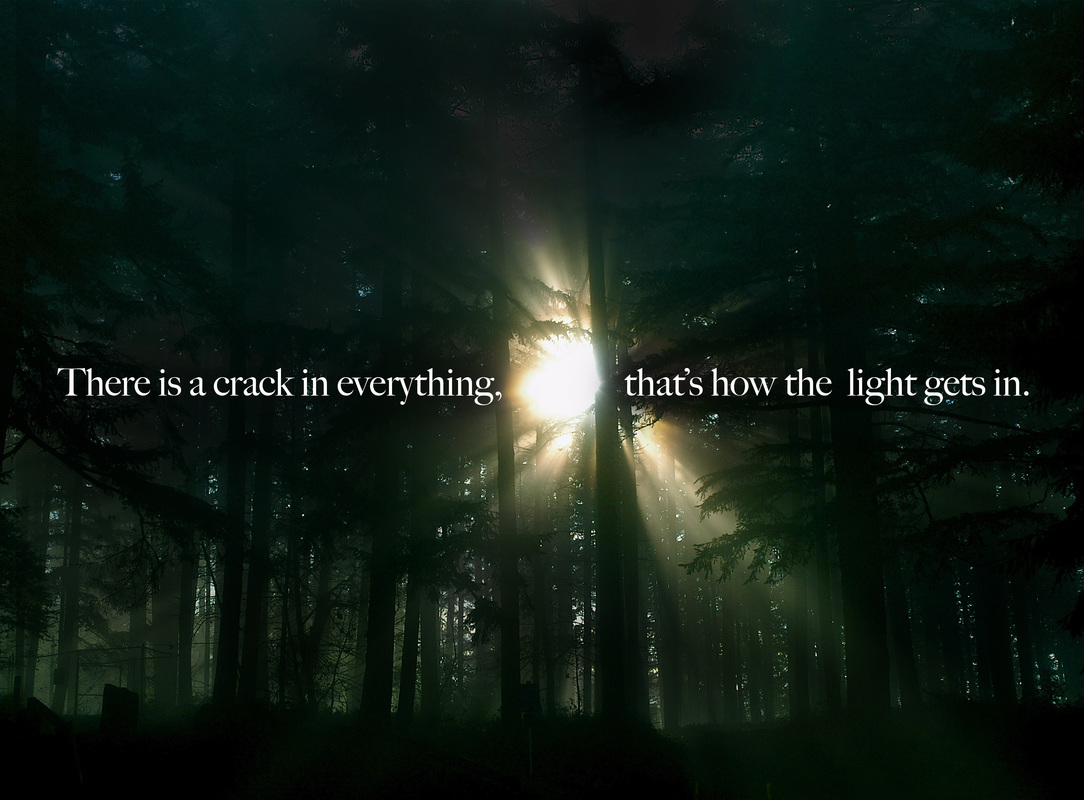|
I learn a lot talking with musicians, visual artists and dancers, perhaps more than talking with other writers, playwrights and theater people. When I talk with people who do what I do, no matter how much I can't stand expert syndromes ("I've done this for __ years, what more is there to know?"), I still don't want to sound like a novice. Neither do they, I imagine. When I talk with artists who have more experience in other fields than writing or theater, I'm more open with my questions. It's easier for me to remember that I don't need to prove myself. I feel less like, "Oh I should already know this (famous artist/process/art piece), so I'll pretend I know and then look up the (trivia/advice/history) later. Instead, I allow myself to say, "Who/what/why's that?" With the right people, vulnerability combined with curiosity and interest adds up to fabulous conversations that connect us across disciplines. This cultivates empathy and helps both sides navigate new territory and ideas. Sure, some people are more willing to dish out shame than nonjudgmental answers, but a lot fewer than I fear. These thoughts occurred to me after brunching with musicians last weekend. I learned about their recent recording processes. I discovered how many ways their experiences aligned with what I know about submissions, publications and play productions. I asked a lot of questions. I uncovered new ways of doing things. The musicians enjoyed opening up and telling me what they knew. I enjoyed doing the same. We had a great conversation. This all served as a great reminder to embrace an interdisciplinary, transdisciplinary and multidisciplinary approach in my own art. Our brunch talk also prodded me to ask other writers and theater makers more questions. Why assume I know how others do what they do because they do what I do? Why try to be smart around other people who write every day, instead of beginning again each moment? When I allow myself to ask questions that show I don't know something, I create an opportunity for learning and better conversations. Maybe it's just me shutting up so I look like I know what I'm talking about, but if everyone wants to look cool as though, "Of course I've seen that play/read that anthology/heard that speaker/trained in that practice/learned that technique," then what are we talking about? What are we learning? I have a lot to learn about bravery, vulnerability and honest communication. Outside of talking with artists about their craft and process, these simple thoughts remind me that though time spent with people who share my experiences and perspectives leads to cushy delight in the form of nods and knowing laughter, it's important to cross bridges and sit with people whose views oppose my own. Talking with people who hold contrasting ideologies can feel uncomfortable and difficult, but they teach me where people come from, which makes it easier for us all to learn something. After I go outside my comfort zone into a difficult conversation about Donald Trump, let's say, or rampant racism in our culture, it's important for me to return to an cozier environment where I'm surrounded by people who share my beliefs -- even if it's me alone in a room with my books. This strengthens me with self-care, so I can go out again later and determine where we all stand without attitudes of judgment or defensiveness further dividing us. So get out of your room (I'm telling myself). Ask more questions. Eat all the berries.
1 Comment
Have a Heart. For this free drop in workshop for 3rd through 6th graders last Saturday, I was feeling a lot of big feelings and wanted to give the room a chance to look into their own emotions by discovering how to describe their hearts through metaphor. I also thought that by describing our hearts, we could grow the amount of heartening empathy in the room. It was a worthwhile experiment that could use some tweaking, and I'm excited to try it again after more finessing. Starting with conversation: First we discussed how we can define metaphor and what figurative language can do for our writing. I believe metaphors can help bring our words to life, illuminating the hidden meaning locked in a sentence (and in everyone’s story). Then we read this huge heart poem: Heart BY DORIANNE LAUX The heart shifts shape of its own accord-- from bird to ax, from pinwheel to budded branch. It rolls over in the chest, a brown bear groggy with winter, skips like a child at the fair, stopping in the shade of the fireworks booth, the fat lady's tent, the corn dog stand. Or the heart is an empty room where the ghosts of the dead wait, paging through magazines, licking their skinless thumbs. One gets up, walks through a door into a maze of hallways. Behind one door a roomful of orchids, behind another, the smell of burned toast. The rooms go on and on: sewing room with its squeaky treadle, its bright needles, room full of file cabinets and torn curtains, room buzzing with a thousand black flies. Or the heart closes its doors, becomes smoke, a wispy lie, curls like a worm and forgets its life, burrows into the fleshy dirt. Heart makes a wrong turn. Heart locked in its gate of thorns. Heart with its hands folded in its lap. Heart a blue skiff parting the silk of the lake. It does what it wants, takes what it needs, eats when it's hungry, sleeps when the soul shuts down. Bored, it watches movies deep into the night, stands by the window counting the streetlamps squinting out one by one. Heart with its hundred mouths open. Heart with its hundred eyes closed. Harmonica heart, heart of tinsel, heart of cement, broken teeth, redwood fence. Heart of bricks and boards, books stacked in devoted rows, their dusty spines unreadable. Heart with its hands full. Hieroglyph heart, etched deep with history's lists, things to do. Near-sighted heart. Club-footed heart. Hard-headed heart. Heart of gold, coal. Bad juju heart, singing the low down blues. Choir boy heart. Heart in a frumpy robe. Heart with its feet up reading the scores. Homeless heart, dozing, its back against the Dumpster. Cop-on-the-beat heart with its black billy club, banging on the lid. And discussed it. This poem is full of metaphors, and also similes, personification, images, the senses. What do you notice here? And what metaphors can you find? What are some of your favorite images, pictures that come to your mind reading this? See how this heart is and does and has and represents so many things? What kind of person might belong to a heart like this? Then we visualized our own hearts: Now consider your own heart. Close your eyes, or let them rest in front of you if closing them makes you uncomfortable. Think of all the things your heart does. Visualize it doing those things. Everything your heart feels, thinks wants. Everything it makes, contains, creates. Maybe it does and thinks and wants and feels and sees a lot more than you thought. And wrote about them. Now, write down everything you can about your heart. Use Laux’s poem as inspiration, but what you write doesn’t have to be a poem. It can be a poem, or a story, an essay, or just a bunch of writing. In your writing, show everything contained in your heart. Don’t leave anything out. All the actions, the states and desires and hopes and dreams and and and...? Show us YOU through your heart. Write with bravery. Try and fill the page. Use metaphor. Use images, sensory detail, simile, personification if you can. A few shared, and we witnessed some sweet opening among us. For me, spending a couple sessions writing all images and metaphors that showed my heart got me recreating myself in a way. I transformed heavy emotions into something tangible and more speakable. I felt like I could know and share myself better. I'm not sure all the young writers got as much out of this exercise as I did this first time around, but I hope a few found some positive transformation as I did. Try it yourself. Let me know what you think (and feel). For some months now, I've been growing and developing a play that attempts to uncover how we talk about grief, mainly to our children, as it's to be a play for young audiences. I've been writing, sketching and outlining with my father in mind, who died in 2014, when I turned 30 and was starting graduate school, and didn't give myself much time or space to deal with the loss, but kept adding work and panic on top of my whole self so I could move forward and do my schoolwork without falling behind. I've since found ways to deal with my grief, and part of my way of doing that is writing this play. Tuesday night, in reaction to our nation electing a President I believe unfit to lead us, who promotes hate and exclusion and fear and bigotry, I cried deeper and heavier than I can remember doing since I got the news my dad was going into hospice and there was no more the doctors could do after his 9 month cancer battle. That night and next morning brought back all those grief feelings from years ago that I didn't know what to do with in 2014. Emptied out of tears, not wanting to enter the next day but knowing I must, and knowing there are so many people we need to hold up in love and light, I was a mess of hollow conflict. And I knew that those emotions were part of this time, and I had several others who were mourning with me. And now, losing Leonard Cohen opens all those wounds again. But yes, this is not the time for despair. This is time to be here for each other. To make loud and reactive art. To write in bigness and concise rebellion, in ways that brings people together, and spreads love to those who need it most right now. I know this is a time to stand up and be strong and brave, for those who are afraid to speak, for those who are afraid for their lives, who fear the oppression that a man embracing misogyny, racism, and mass deportation has threatened to uphold. And I know it's also okay to grieve right now. This play I'm writing is taking on the same personal reflection, and still trying to communicate with children about how to talk about hard times, but also will embrace a larger, national, global mourning - and a mourning toward morning, toward action, toward positivity. So here, I open up this as a space for you to share your own grief and sadness, as well as thoughts of light and change and empowerment, or words of gratitude and breath and life, anything on the wide spectrum of those seven grief stages. And if a public forum is not for you, know that I'm here for you who are scared and heavy right now. We can talk in person when I see you next. I want to hear your voice ring out and I want to stand for you in bravery. You are not alone. My plays often contain memory as a major thematic and plot element. Past ghosts come back to haunt. Kilgore has that, and Me and My Shadow, How to Hide Your Monster, all of the Marshlands puppet plays, New Eden, DIRT...all of them, to some extent. For years I've half wondered about this, striving to make each piece active in the present tense while knowing an integral force of the play's genesis is the past rising up. Memory is a big deal for me, and forgetting is one of my retaliations. I can have a hard time remembering things -- events, people. I used to block out whole sections of my life. Many memories bring up shame, fear, ugliness, and this is a common reaction. I learned to stir up my recall through one of Natalie Goldberg's key tools in writing practice, her "I Remember" exercises. Now I've been doing yoga a lot, and deeply lodged images from years ago resurface in unexpected bursts, carrying big emotion and physical effects with them. Events from faraway times still carry heavy weight.  Goldberg's Writing Down the Bones and Wild Mind directly impacted my relationship between writing and memory. Her books helped me remember my life enough to make my life better, through writing. Goldberg's Writing Down the Bones and Wild Mind directly impacted my relationship between writing and memory. Her books helped me remember my life enough to make my life better, through writing. In a flash in the shower yesterday, I saw clearly for the first time that of course my work deals heavily in what once happened. My personal fears in life tend to center around my own history coming back to overwhelm and take over, present me as a fraud and a failure, strip me from everything I have now because of who I once was and what I did, who I was with, all of it. I don't think it's all fear-based. Maybe because things are good right now -- really they are good, I can admit that with gratitude -- then going into memory is my access point of opening up dramatic conflict, and also touches into empathy. I can relate to struggle because of memory. Lately though, I feel myself getting more active in the present tense in my writing. I'm more interested in plays centered on this moment. Perhaps that moment is set in history or inspired by long ago, but the dramatic events are occurring right now more than conjuring up of the great before. The play I'm starting right now deals with grief -- which is a big memory influence -- but it deals with present grief, something happening right now in the play world. Present mourning, present adventure, present transformations and present reclamations. Knowing more about the foundation of memory in my plays is helpful, aesthetically speaking. I'm learning that pulling from both the past and the future is what can bring us into the present - and maybe that's why some say the present can't actually exist. I'm still affected by a classmate's proclamation's last year, who said, "Good art has both roots and reach." We're thinking of our past and future in these present elections, in political movements and protests. I think about them as I work with students this week opening a new devised production this week. I think about them in my love relationship, friendships and family life. And I definitely think about them in my writing. So yes, I'll indulge in both memory and forward movement in this play I'm starting, as I continue this walk toward present awareness. |
Like what I'm posting? You can leave me a tip!
$1, $10, $100, whatevs :) Heidi KraayProcess notes on a work in progress (me). This mostly contains raw rough content pulled out of practice notebooks. Occasional posts also invite you into the way I work, with intermittent notes on the hows and whys on the whats I make. Less often you may also find prompts and processes I've brought to workshops, as well as surveys that help me gather material for projects. Similar earlier posts from years ago can be found on: Archives
April 2024
Categories
|



 RSS Feed
RSS Feed